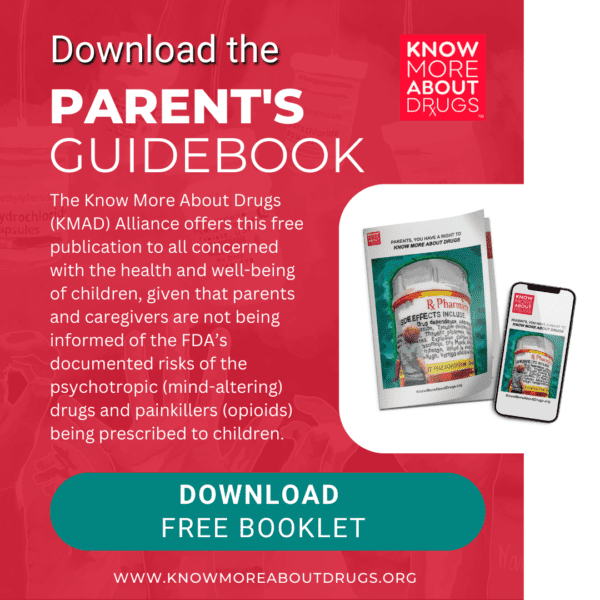YOU HAVE THE RIGHT TO KNOW MORE about drugs
Many of the drugs prescribed to children merit a “significant” health concern by the FDA.
We believe that parents need to have enough information about the serious side effects of prescription opioids and psychotropic drugs to make informed decisions before agreeing to administer these drugs to their children.
YOU HAVE THE RIGHT TO KNOW MORE about drugs
Many of the drugs prescribed to children merit a “significant” health concern by the FDA.
We believe that parents need to have enough information about the serious side effects of prescription opioids and psychotropic drugs to make informed decisions before agreeing to administer these drugs to their children.
WHAT PARENTS NEED TO KNOW
Most parents are unaware of the Food and Drug Administration’s (FDA) MedGuides; yet these FDA-approved information sheets are vital for informing parents about the potential for serious drug side effects and pediatric risks.
MedGuides are very different from the small package inserts that usually accompany a prescription drug. The normal prescription drug package inserts can be extremely lengthy, use medical terminology that is incomprehensible to the average consumer, and are normally printed with a very small font (4 point), which is difficult to read.
WHAT PARENTS NEED TO KNOW
Most parents are unaware of the Food and Drug Administration’s (FDA) MedGuides; yet these FDA-approved information sheets are vital for informing parents about the potential for serious drug side effects and pediatric risks.
MedGuides are very different from the small package inserts that usually accompany a prescription drug. The normal prescription drug package inserts can be extremely lengthy, use medical terminology that is incomprehensible to the average consumer, and are normally printed with a very small font (4 point), which is difficult to read.



Conversely, MedGuides were specifically designed to be easier for the average consumer to read and understand. They must use a larger font (no smaller than 10 point), must be written using “nontechnical, understandable language,” and “shall not be promotional in tone or content.”
They must describe “the particular serious and significant public health concern that has created the need for the Medication Guide” and must note any known “pediatric risks.”
Parents may also be unaware that per the Federal Code of Regulations, MedGuides must include “a statement of the risk, if there is one, of the patients developing dependence on the drug product.”
PRESCRIBED DRUGS THAT CARRY A RISK OF DRUG DEPENDENCE INCLUDE MANY ADHD DRUGS, ANTI-ANXIETY DRUGS AND PRESCRIBED OPIOIDS, ALL OF WHICH ARE CURRENTLY PRESCRIBED TO CHILDREN.
Conversely, MedGuides were specifically designed to be easier for the average consumer to read and understand. They must use a larger font (no smaller than 10 point), must be written using “nontechnical, understandable language,” and “shall not be promotional in tone or content.”
They must describe “the particular serious and significant public health concern that has created the need for the Medication Guide” and must note any known “pediatric risks.”
Parents may also be unaware that per the Federal Code of Regulations, MedGuides must include “a statement of the risk, if there is one, of the patients developing dependence on the drug product.”
PRESCRIBED DRUGS THAT CARRY A RISK OF DRUG DEPENDENCE INCLUDE MANY ADHD DRUGS, ANTI-ANXIETY DRUGS AND PRESCRIBED OPIOIDS, ALL OF WHICH ARE CURRENTLY PRESCRIBED TO CHILDREN.
IF MEDGUIDES ARE SO IMPORTANT, WHY AREN’T PARENTS INFORMED ABOUT THEM?
IF MEDGUIDES ARE SO IMPORTANT, WHY AREN’T PARENTS INFORMED ABOUT THEM?
While the FDA requires Medication Guides be available to consumers through pharmacists when dispensing drugs, most parents are unaware that they can read these Medication Guides online, before a drug is prescribed to their child, in order to have an educated and informed conversation with their prescribing physician.
THE KNOW MORE ABOUT DRUGS ALLIANCE BELIEVES EVERY PARENT SHOULD BE MADE AWARE OF MEDGUIDES IN ORDER TO BE FULLY INFORMED OF A DRUG’S RISK BEFORE ADMINISTERING IT TO THEIR CHILD.
This is particularly true given that many of the drugs prescribed to children merit a “significant health concern” by the FDA, thus requiring a MedGuide.
For example, the MedGuide for a commonly prescribed antidepressant states the drug “may increase suicidal thoughts or actions in some children, teenagers, and young adults”; while another MedGuide states that a common ADHD drug can include side effects of “new psychotic symptoms (such as hearing voices, believing things that are not true…) or new manic symptoms.”

While the FDA requires Medication Guides be available to consumers through pharmacists when dispensing drugs, most parents are unaware that they can read these Medication Guides online, before a drug is prescribed to their child, in order to have an educated and informed conversation with their prescribing physician.
THE KNOW MORE ABOUT DRUGS ALLIANCE BELIEVES EVERY PARENT SHOULD BE MADE AWARE OF MEDGUIDES IN ORDER TO BE FULLY INFORMED OF A DRUG’S RISK BEFORE ADMINISTERING IT TO THEIR CHILD. THIS IS PARTICULARLY TRUE GIVEN THAT MANY OF THE DRUGS PRESCRIBED TO CHILDREN MERIT A “SIGNIFICANT HEALTH CONCERN” BY THE FDA, THUS REQUIRING A MEDGUIDE.


And while MedGuides do not contain every documented risk associated with a prescription drug (nor does every brand-name drug have a MedGuide), it is a starting point for parents faced with an emotional choice regarding these drugs and their children to educate themselves about any potential risk.


This is particularly true given that many of the drugs prescribed to children merit a “significant health concern” by the FDA, thus requiring a MedGuide.
For example, the MedGuide for a commonly prescribed antidepressant states the drug “may increase suicidal thoughts or actions in some children, teenagers, and young adults”; while another MedGuide states that a common ADHD drug can include side effects of “new psychotic symptoms (such as hearing voices, believing things that are not true…) or new manic symptoms.”
And while MedGuides do not contain every documented risk associated with a prescription drug (nor does every brand-name drug have a MedGuide), it is a starting point for parents faced with an emotional choice regarding these drugs and their children to educate themselves about any potential risk.

HOW TO SEARCH THE MEDGUIDES
The Medication Guides are available online and are searchable by brand name of the prescribed drug. They are also listed alphabetically. Parents should ensure they search using the search box indicated by the red arrow in the screenshot below, not the search box at the top right of the Medication Guide page. NOTE: MEDICATION GUIDES ONLY WORK ON DESKTOP APPLICATIONS AND NOT ANY MOBILE DEVICES.


